May 02, 2011 – 09:20 am EDT
It was new highs across the board this week and nothing particularly out of the ordinary to be honest. Pressed for time, I will get right to the point…
.
**** We have just passed $1000 in donations to the Heart Foundation thanks to your generosity! If you get value from these newsletters then please do something in return; give generously to Heart Racer and invite your friends to join our mailing list. Thanks!
.
ETF % Change Comparison
.

The Transports had a spectacular week advancing 4.31% while SMH has risen 12.72% off the low it set 44 days ago. Money flowing into these economically sensitive areas is a positive sign for the health of the market over the medium term.
Learn more – ETF % Change Comparison
.
![]()
.
A Look at the Charts
.
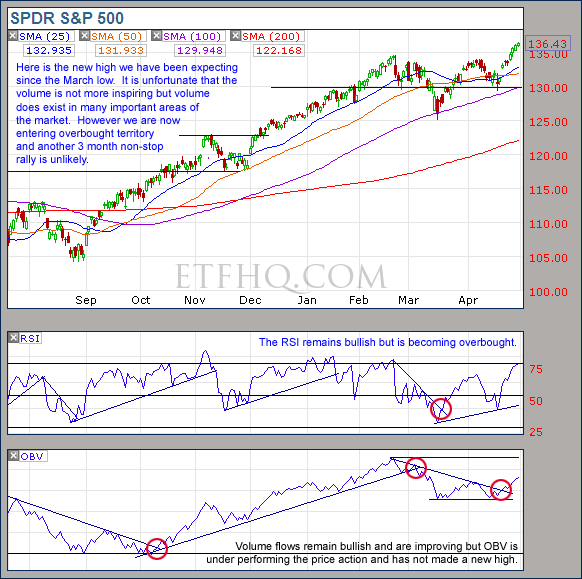
OBV is not confirming the new high from SPY but thankfully IWM and IYT are (see below).
.
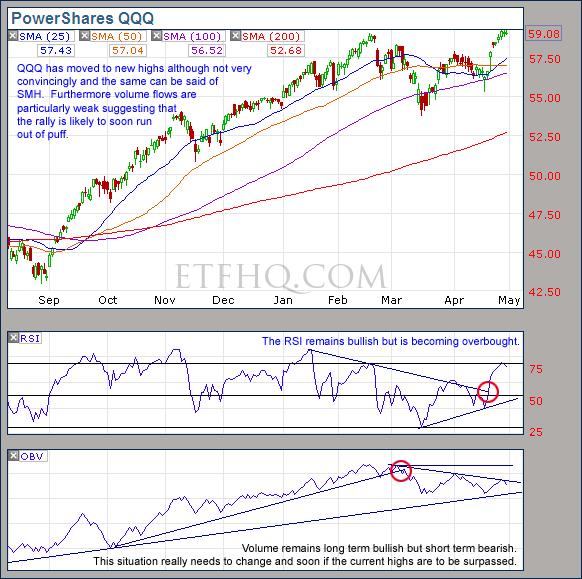
The volume on QQQ is particularly weak. Hopefully selling will be light during the next pull back.
.
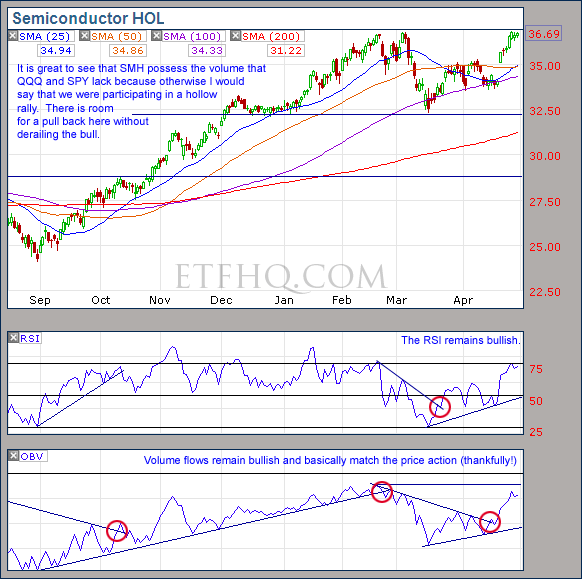
SMH has much healthier volume than QQQ. It would be nice to see more convincing new highs.
.
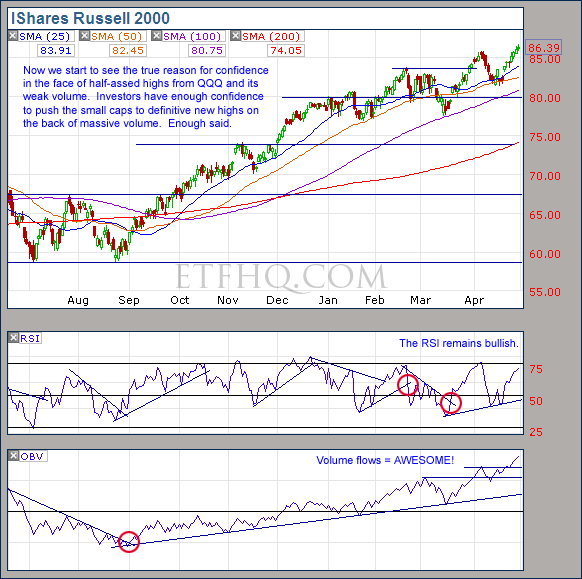
Love the Small Caps lots! Great price action on great volume.
.
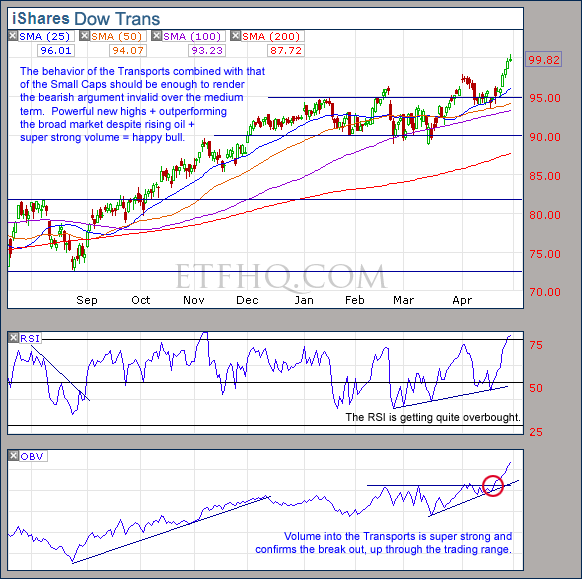
Look at this chart and then try to convince someone we are in a bear market I dare you.
.
![]()
.
OM3 Weekly Indicator
.

Notice how the comparatively economically stable SPY and DIA are registering less bullish readings than the other more economically sensitive ETFs. This is a positive sign.
Learn more – The OM3 Indicator
.
![]()
.
TransDow & NasDow
.

TransDow – The Transports have gained dominance over the Dow again and the TransDow opened a new position on Friday.
NasDow – The Dow remains dominant over the NASDAQ after 140 days during which time the Dow has advanced 12.27% compared to 8.95% for the NASDAQ.
.
What the TransDow Readings tell us:
The TransDow measures dominance between the DJ Transportation Index (DJTI) and the Dow Jones Industrial Average (DJIA). In a strong market the more economically sensitive Transportation Index should be dominant over the DJIA.
Historically the DJTI has been dominant over the Dow 45% of the time. The annualized rate of return from the DJTI during this period was 18.47% with the biggest loss for one trade sitting at -13.27%. The annualized return from the DJIA during the periods it was dominant over the DJTI was just 4.06% and the biggest loss for one trade was -16.13%. A 4% stop-loss is applied to all trades adjusting positions only at the end of the week.
What the NasDow Readings tell us:
The NasDow measures dominance between the NASDAQ and the DJIA. Using the same theory behind the Trans Dow; in a strong market the more economically sensitive NASDAQ should be dominant over the DJIA.
Historically the NASDAQ has been dominant over the DJIA 44% of the time. Taking only the trades when the NASDAQ is above its 40 week moving average the annualized rate of return was 25.47% with the biggest loss for one trade sitting at –8.59%. The annualized rate on the DJIA during the periods it was dominant over the NASDAQ is just 8.88% and the biggest loss for one trade was –12.28%. A 8% stop-loss is applied to all trades adjusting positions only at the end of the week.
.
![]()
.
LTMF 80 & Liquid Q
.
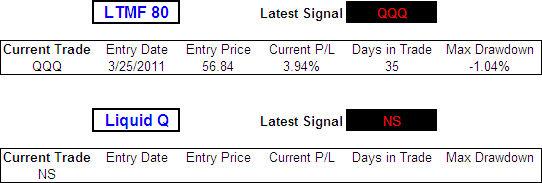
LTMF 80 continues to hold a position in QQQ that is showing a profit of 3.94% after 35 days. Liquid Q remains in cash.
.
Historical Stats:
.

.
How The LTMF 80 Works
LTMF stands for Long Term Market Forecaster. It reads volume flows relative to price action and looks for out performance of volume measured on a percentage basis over the prior 12 months. During a sustained rally the readings will reach high levels (near 100%) making it imposable for the volume reading to always outperform price so any reading above 80% will maintain the buy signal. This system has outperformed the market over the last 10 years but performance has been damaged by some nasty losses. It only produces buy signals and only for QQQ.
How Liquid Q Works
Liquid Q completely ignores price action and instead measures the relative flow of money between a selection of economically sensitive and comparatively stable ares of the market. It looks for times when the smart money is confident and and can be seen by through volume investing heavily is more risky areas due to an expectation of expansion. This system has outperformed the market over the last 10 years and remained in cash through most of the major declines. It only produces buy signals and only for QQQ. We will provide more performance details on the web site for these systems soon.
.
![]()
.
Summary
After an explosive little rally the market has become overbought. The short term outlook is unclear but over the medium to longer term is remains very positive.
Any disputes, questions, queries, comments or theories are most welcome in the comments section below.
.
Cheers
Derry
And the Team @ ETF HQ
“Equipping you to win on Wall St so that you can reach your financial goals.”
.
![]()
.
Quote of the Day
“Don’t become that which you seek to destroy. If you want to cut down a tree, it is no use to climb into its branches.”
.
.
Derry,
I would point out to you that we have a 2,000 pound elephant standing in our way in the near future……. On June 15th QE-2 (POMO) ends……. Ever since the start of QE-1 in March 2009 the markets have rallied, only to fall when POMO ends, then rally again as POMO returns. My experiences are telling me that selling will begin before POMO ends on June 15th and really increase as we get closer to that date….. As we have seen neither an increase in manufacturing nor purchases nor a reduction in unemployment here in the states, I am left to believe that this rally is simply a POMO induced fraud which will fall quickly as the injections of 4-8 billion a day cease happening.
Mike Scott
You are probably 100% right Mike. It is my firm belief however that warning signs and cracks will show in the market before any major declines occur. I would expect the more economically sensitive areas of the market to start to under performing and see heavy volume on any declines.
Interesting times, lets make hay while the sun shines and then make a killing when it all implodes!